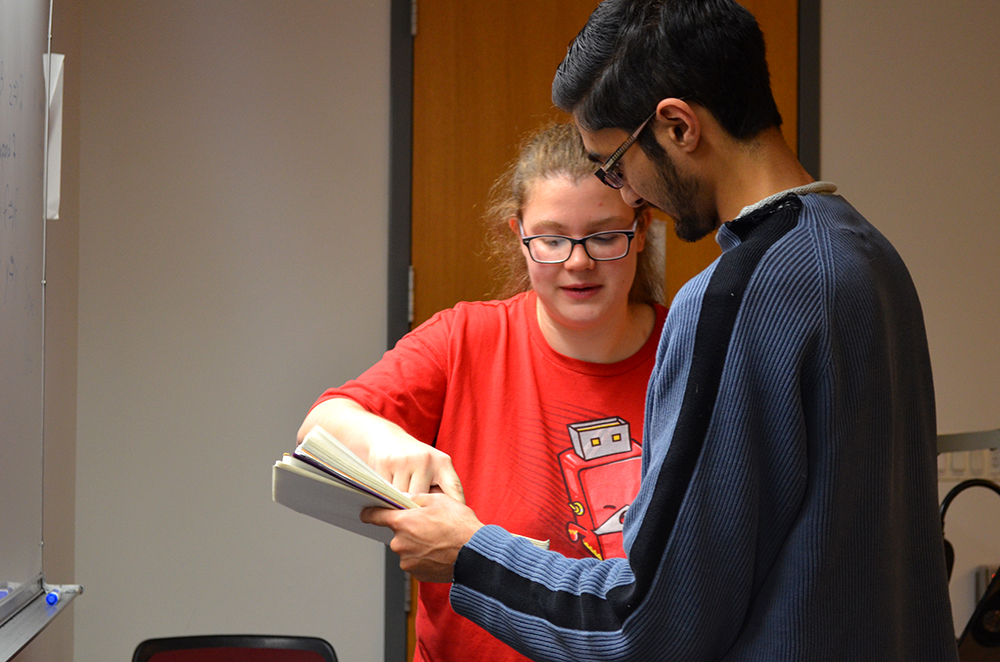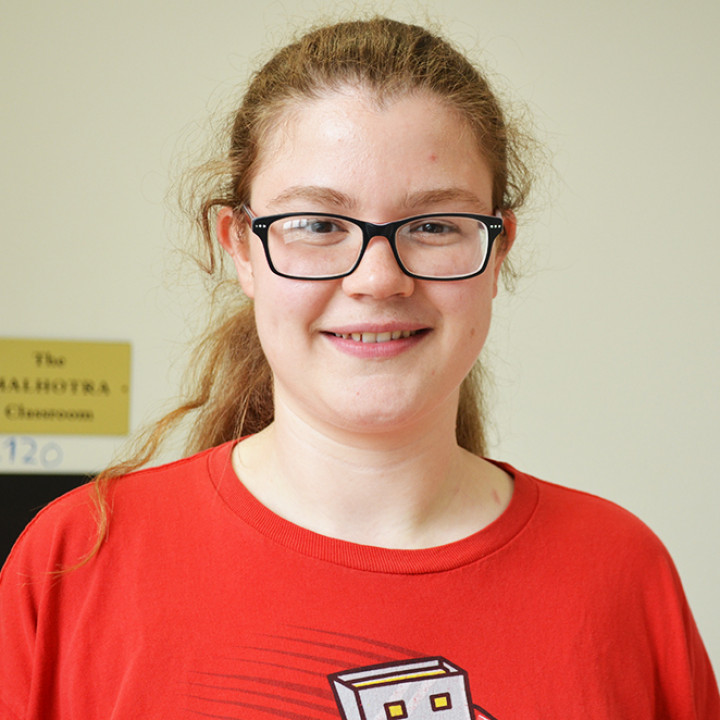Amelia Bateman: TA, Microsoft Intern, and Functional Programming Fanatic
You may have seen Amelia bouncing from one student to the next in the TA room of AV Williams, or maybe heard her distinct voice calming another frantic student who is failing a release test. If you’re a witness to this, then you can probably attest to seeing that same student’s submit server go from a whole lot of red, to all green after just a few minutes of conversing with her.
It seems as though Amelia’s position as a TA was inevitable. “I noticed a pattern in high school. All of the volunteer work and groups I’d been a part of involved some form of working with kids and teaching.” Her knack for teaching developed in middle school, when she started tutoring in subjects like math, Hebrew, and even chess.

Last semester Amelia doubled as a TA for FIRE (UMD’s First-Year Innovation & Research Experience) and grading TA for CMSC330. “I’ve always been interested in teaching, I’m just not interested in going to school for education.” She is a full-time CMSC330 TA this semester, and is just as thrilled and enthusiastic about teaching as she was about learning when she was a student of the course. She jokes (but not really), “I want to spread the love of functional programming!”
As a student of the Gemstone Honors Program, Amelia and her team (Team Haptic) are developing an assistive device for blind children who are learning mathematical concepts. The team is using an electrostatic overlay designed by Tangible Haptics. When this technology is paired with a touchscreen device, it can be programmed to display tactile images. These “textures” can then make the brain perceive shapes and lines.
“We are working on shape recognition, and hopefully we will touch upon not graphs fully themselves, but a lot of the concepts that lead up to that.” The team is currently testing the device with visually impaired adults so they can understand how they perceive the vibrations of the overlay and just get overall feedback. Soon, they will run a similar study with visually impaired children. “We really want to run [the study] with children because they learn differently. It may be hard for them to learn these concepts because they just don’t have as much experience exploring the world [as adults do], but they are a lot better with technology.”
Last summer, Amelia headed to Wisconsin for her first internship with Epic Systems, a company specializing in health services. Epic builds software for hospital systems, which handle everything from the movement of patients, to the organization of medical and insurance documentation. Amelia was randomly placed on a team with two other interns, a team leader, and a mentor. In just twelve short weeks, she and her team created a Microsoft Surface app for hospital bed planning.
The app provides nurses and doctors with a more accessible way to utilize bed space with respect to the continuous admission, discharge, and transfer of patients. It appears to be a fairly simple concept, however when you have to integrate your code with existing code and the data of a particular hospital, it becomes significantly more complex. And unlike coding projects at Maryland, you can’t just give up and stop working once the deadline passes. Amelia adds, “The most valuable experience was figuring things out through failure. You really push through and rely on yourself and your team to make it work.”
Although Amelia’s time at Epic surpassed her expectations (Epic took its two-hundred interns rock-climbing and to a water park), she is a big proponent of working in different environments with different company dynamics, given the opportunity. “You should always try something new. I am looking forward to having a different experience at Microsoft.” Amelia will most likely be working with the Microsoft OneDrive team.
Before taking AP Computer Science as a schedule filler in high school, Amelia had never considered programming as an academic or career option. She entered Maryland as a declared math major, decided to enroll in CMSC131, and quickly tacked on a computer science major to her existing studies. And after landing her second internship with Microsoft and getting the chance to TA her favorite class, she feels as though the combination of computer science and math has given her a sense of direction that math could not have provided her with on its own.
Amelia has made it a point to take classes she thinks will be interesting, rather than adhere to whatever the consensus is about which classes are most practical, or which will look best for graduate school. She is currently enrolled in cryptology, combinatorics and graph theory, and bioinformatics. “I would like to hope I look good on paper, but it’s never my first priority.”
Even though Amelia has strayed from the “recommended” computer science courses Maryland offers, and has the freedom to take classes like beginners jogging because of AP credits, she undoubtedly keeps her schedule challenging. Amelia will be taking a graduate level, mathematical logic class next semester, but also plans to enroll in a classical guitar course. And as a soon-to-be-senior, she has some words of wisdom: “There is not much of a sense of being a ‘weird kid’ in college. Everybody’s weird, so do what you like.”
The Department welcomes comments, suggestions and corrections. Send email to editor [-at-] cs [dot] umd [dot] edu.
